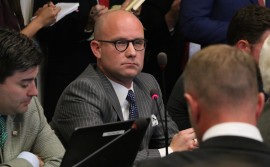Controversial Tax Passes Budget Committee

A bill that would increase the sales tax on cigarettes by $1.50 passed a House budget committee by a 19-9 vote and later cleared the state Senate’s budget committee on a 10-2 vote, Tuesday.
But it wasn’t easy.
Democrats complained they only learned know the details of the plan just three minutes before the meeting. Republicans, they said, had close to two months to review the proposal.
“How do you expect for us to read a full document that was made probably fifteen minutes before the meeting and given to us by three minutes before?” Rep. Ed Cannaday, D- Fayetteville, said. “It’s bad when we haven’t heard anything about a plan until just now.”
Language in the proposal was vague. Money generated by the tax would be given to various healthcare services without listing any specific agency.
Committee Chairman Kevin Wallace, R-Wellston, pushed for the bill’s passage.
“If we don’t come up with the $215 million to bridge the gap, then more agencies will have to be cut to make up for the difference,” he said. “It will go to healthcare, plain and simple. You don’t have to take me at my word, read the bill. If you want to fill the gap, we’re going to use the cigarette fee, the rainy day fund and the reserved money.”
Others disagreed.

House Minority Leader, Rep. Scott Inman, D-Oklahoma City, objected to the bill. Inman said the measure didn’t raise enough money.
Records show House Bill 1099 would only generate $129.8 million, because the measure is being considered so late in the year. That presented a problem for Inman. Inman asked where the remaining $85.2 million was coming from.
Wallace said lawmakers could tap into the General Revenue Fund and the Rainy Day Fund.
In addition to Inman, Rep. John Bennett, R-Sallisaw, said he opposed the bill. State agencies, Bennett said, should be audited for over-spending and any tax proposal should go to the people.
“Let’s be accountable and do the right thing,” Bennett said. “Do not pass this bill so that we can have some time to find an alternative to this problem.”
Bennett was echoed by Inman.
“There’s no reason for either one of us because there’s no option. You can offer the same plan over and over again but it will fail,” Inman said. “I’m disappointed that we have to be here to do the same thing.”
Lawmakers were forced into a special session after the Oklahoma Supreme Court ruled in June that the original $1.50 fee was unconstitutional. Republican Governor Mary Fallin signed an executive order to start a special session.
In the State Senate, members of the Joint Committee on Appropriations and Budget argued the merits of the proposal
State Senator John Sparks, D-Norman, questioned the language of the document.
“Since the language is so vague, I move to table the vote until the bill is better understood,” Sparks said. “We’re playing a bit of chicken here with this bill in hopes that we go back to the drawing board or they pass it, the house declares victory and leaves us with a $125 million hole with no cure.”
Along with Sparks, outgoing Senator Dan Newberry, R-Tulsa, said the measure wasn’t fair to taxpayers.
“It’s a fundamental issue to create fair and equitable situation for the taxpayers. Assuming this passes, I’m concerned,” Newberry said. “Though I’m concerned, I think this is a conversation for the greater body. I will vote yes so that we may have a greater conversation.”
The final vote was 10-2.
The bill was expected to go before the full Senate today, however shortly after 10 a.m., House Speaker Charles McCall, R-Need Hometown, announced the special session was on hold. McCall said the House would stay in recess until a budget agreement was reached.
“While we are closer to an agreement, we are not going to waste $30,000 a day negotiating,” McCall said in a media statement. “We pledge to continue negotiating in good faith with the governor and Senate, but we are going to do that off the clock. When there is an agreement in place, we will return and take care of the people’s business.”